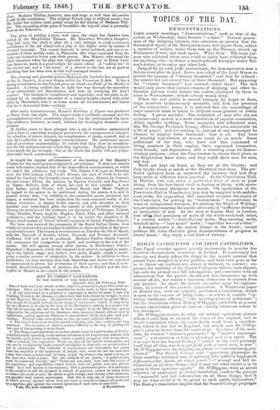AIDS TO CORRECT LAWMAKING.
TQ THE EDITOR OF TIIE SPECTATOR.
' Lincoln's Inn, fish February 1848.
Sin—I have read your article on this subject in yesterday's paper with great sa- tisfaction. Allow me to oifer my contribution to the work, in three suggestions.
1. If any such board as is proposed be organized, it should be made a rule (by Standing Orders, in the Houses, or otherwise) that bills should he brought in only by her Majesty's Ministers. All alterations of the law suggested by private Mem- bers should be brought forward in the shape of resolutions; which, if adopted by the two Homes, it should be the duty of the Ministers to embody ma proper law. The bill for passing this law would be then brought in by the Ministers, and be subjected to the criticisms of the Members; who, however, should still act only by resolutions, calling upon the Alinisters to amend their bill in such and such par- ticulars. Without borne such system as this, no board. could act effectually. 2. The future framers of our acts should avoid long acts, long sections, and long sentences. The existence of these is a main difficulty in the way of finding the law, and of interpreting it when found.
a. The Judges and expoeitons of our law. should learn to construe acts of Perlin- meat faveurably according to the obvious intention of the Legislature, and not with the hostile spirit, intent on cavilling, which a morbid sympathy with wrong-doers, (Nil or criminal, has engendere. Words are after all but fallible instruments, and YOU can by no ingenuity make yourself intelligible to those who are predetermined not to understand. The verbosity of conveyancers and lawmakers has arisen from the stupidity or the tenderness of judges; who, when the law has said that
Man who steals a horse shall be hung, acquit the woman who steels a horse, or the man who steals a mare. The two maxims of our courts, "A penal statute must be ciaistrued strictly," aud " Volait sad, non dixit," have been the source of the repetitions and superfluities which deform both our public acts and private deeds. It is well known to conveyancers that a permission given in a mortgage to the creditor to sell the property in default of payment, oanaot be safely acted en unless the mode of sale, the power to give receipt, and various other incidents, are specified with tedious minutertess. And this is only one of many instances in which persons against whom laws are made or securities framed are protected by a spurious pity against the natural operation of such laws or securities.
'


























 Previous page
Previous page